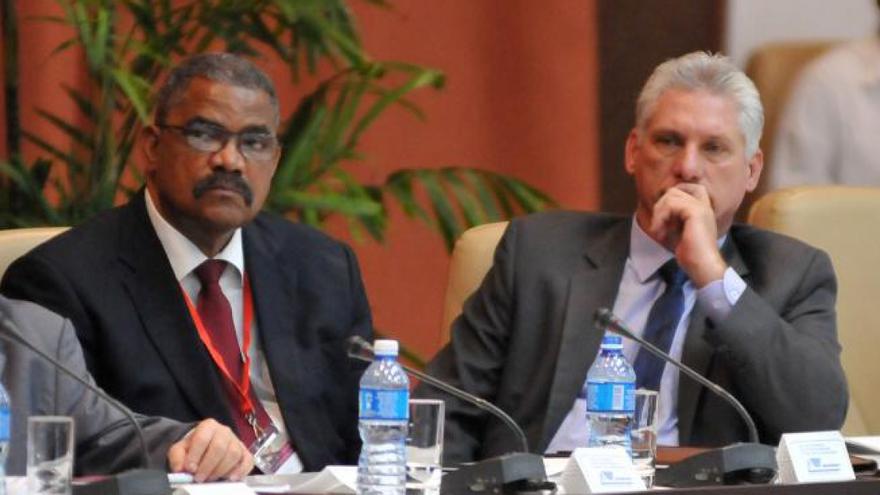
![]() 14ymedio, Reinaldo Escobar, Havana, 15 June 2022 — It has been the reading of El tirano, el oficial y el cuerpo de lobos [The tyrant, the official and the wolf pack] by colleague Carlos Manuel Álvarez, which has motivated me to write this text, which neither argues nor attempts to add anything to his article, but I feel obliged to recognize the source of inspiration.
14ymedio, Reinaldo Escobar, Havana, 15 June 2022 — It has been the reading of El tirano, el oficial y el cuerpo de lobos [The tyrant, the official and the wolf pack] by colleague Carlos Manuel Álvarez, which has motivated me to write this text, which neither argues nor attempts to add anything to his article, but I feel obliged to recognize the source of inspiration.
Neither history, nor mythology, nor even the imagination are really useful to answer the question of who is in charge in Cuba today. And I say today, because in the time between 1959 and 2006 it was clear that the one who ruled in Cuba was a single person who answered to the name of Fidel Castro.
The position of premier, that of president of the Councils of State and of Ministers, that of first secretary of the Communist Party of Cuba and any other were only important, in the period of time indicated, because they were held by Fidel Castro; or to put it another way, those positions did not make him important, but it was he who gave relevance to the position.
But today is another thing.
When the results of the Tarea Ordenamiento [Ordering Task*] or the 63 medidas [63 measures] to solve the problem of agriculture are serenely evaluated; when reading the resolutions of the Ministry of Internal Trade to achieve “a better distribution of basic products to the population,” or when listening to official information on the generation of electricity, any person who does not suffer from a pathology that clouds their understanding will have to come to the conclusion that the country is run by a team of incompetents.
However, it moves, or what is the same thing, the incapable remain in their posts. And this is possible due to the conjunction of two powers: the police and the judicial. Of course, in Cuba there is no “division of powers,” so that when the repressive forces catch an individual who is “non-conformist’ with the Government (with the incompetent) and present him before the courts accused of sedition or collaboration with the enemy, it is as if the accused of a horrendous crime were placed in the hands of the victim’s relatives.
This is not how Justice works, because the one who judges has to be a third party, alien to the one who accuses and the accused.
And what does this have to do with the question of who is in charge in Cuba today?
Well, it has to do with it, in the sense that the dissatisfied cannot express themselves, not even express themselves against the incapable ones who govern, because once they fall under the gaze of the repressors, the citizen automatically passes to the category of guilty in front of the courts.
It is evidence of a triangle apparently formed by the incapable who govern, the repressors who persecute the nonconformists and the courts that condemn those who oppose it. But geometry does not have all the answers. Something is missing here.
Could it be true that above all the visible framework of the incapable who govern expressed in a single party, a ministerial group and a docile parliament, the interests of a family clan predominate?
If so, the obedience of the repressive apparatuses to persecute the nonconformists and that of the courts to convict them, following the guidelines of those who govern, would be due to an intermediary that is dark as it is invisible.
That powerful and mysterious instance, oblivious to the sufferings of the people, who surely despises those who entertain themselves by dictating laws and who half trusts the guardians dedicated to repressing, does not seem to be interested in anything other than accumulating wealth to enjoy the obscene attributes of power. They neither govern nor repress, because those tasks seem unworthy of their high status.
So then: Who rules today in Cuba?
The foreman (the incompetent rulers) commands, at the service of the master (the family clan) and for that he uses the repressors (State Security) and the judicial apparatus.
The people should command along the paths that the Constitution offers them by defining them as sovereign, but when those paths have been assaulted by usurpers then the people find other ways to command.
*Translator’s notes: Tarea ordenamiento = the [so-called] ‘Ordering Task’ is a collection of measures that include eliminating the Cuban Convertible Peso (CUC), leaving the Cuban peso as the only national currency, raising prices, raising salaries (but not as much as prices), opening stores that take payment only in hard currency which must be in the form of specially issued pre-paid debit cards, and a broad range of other measures targeted to different elements of the Cuban economy.
____________
COLLABORATE WITH OUR WORK: The 14ymedio team is committed to practicing serious journalism that reflects Cuba’s reality in all its depth. Thank you for joining us on this long journey. We invite you to continue supporting us by becoming a member of 14ymedio now. Together we can continue transforming journalism in Cuba.
